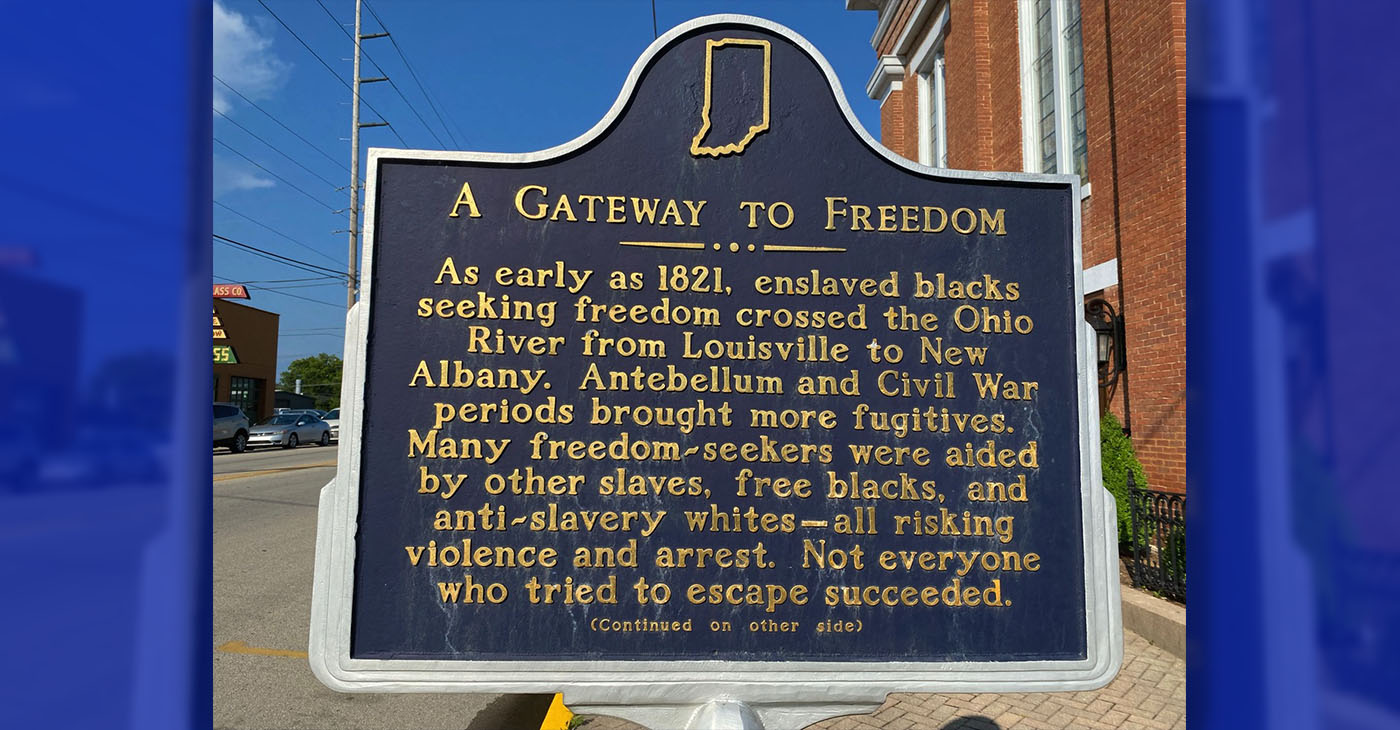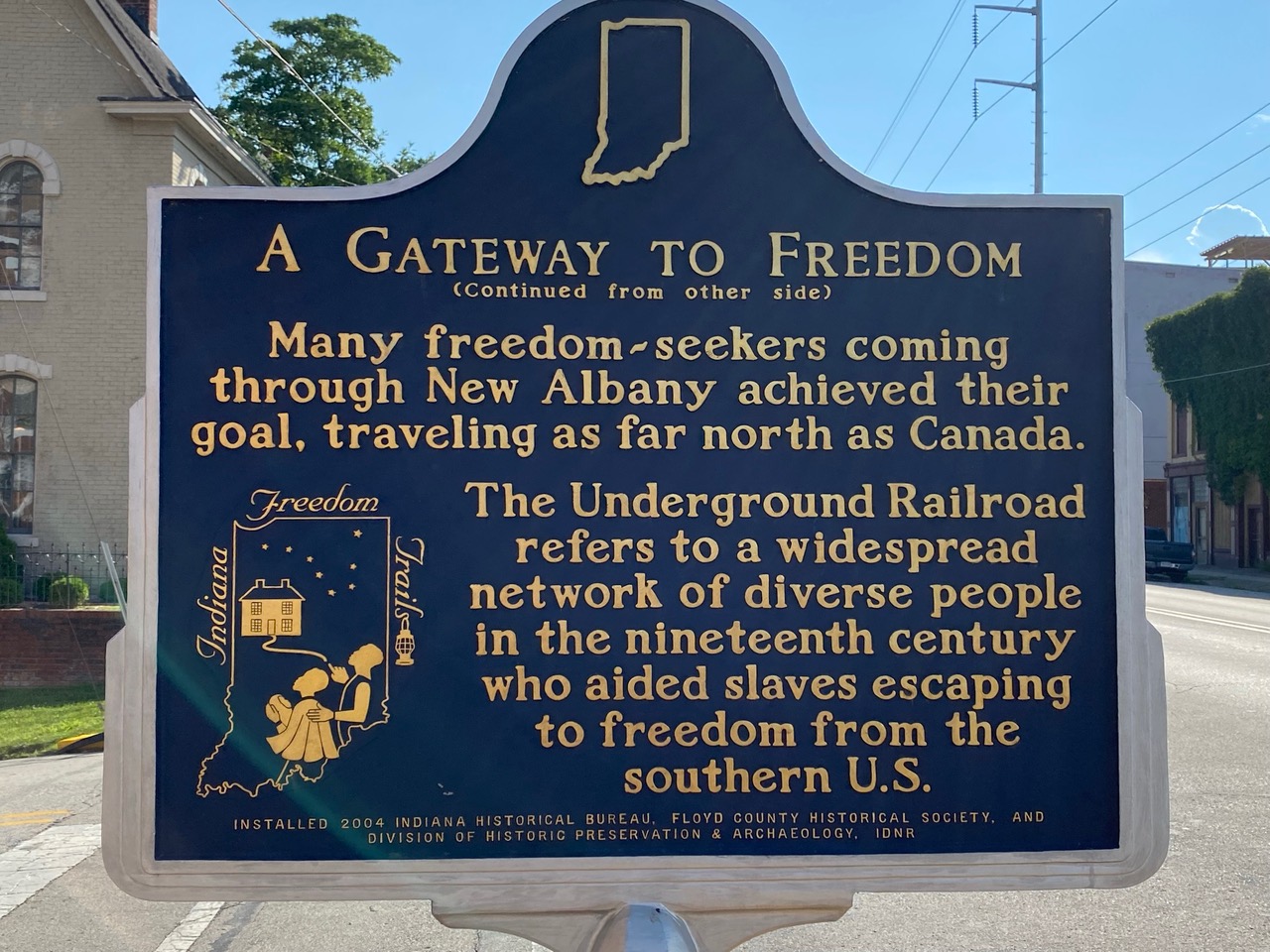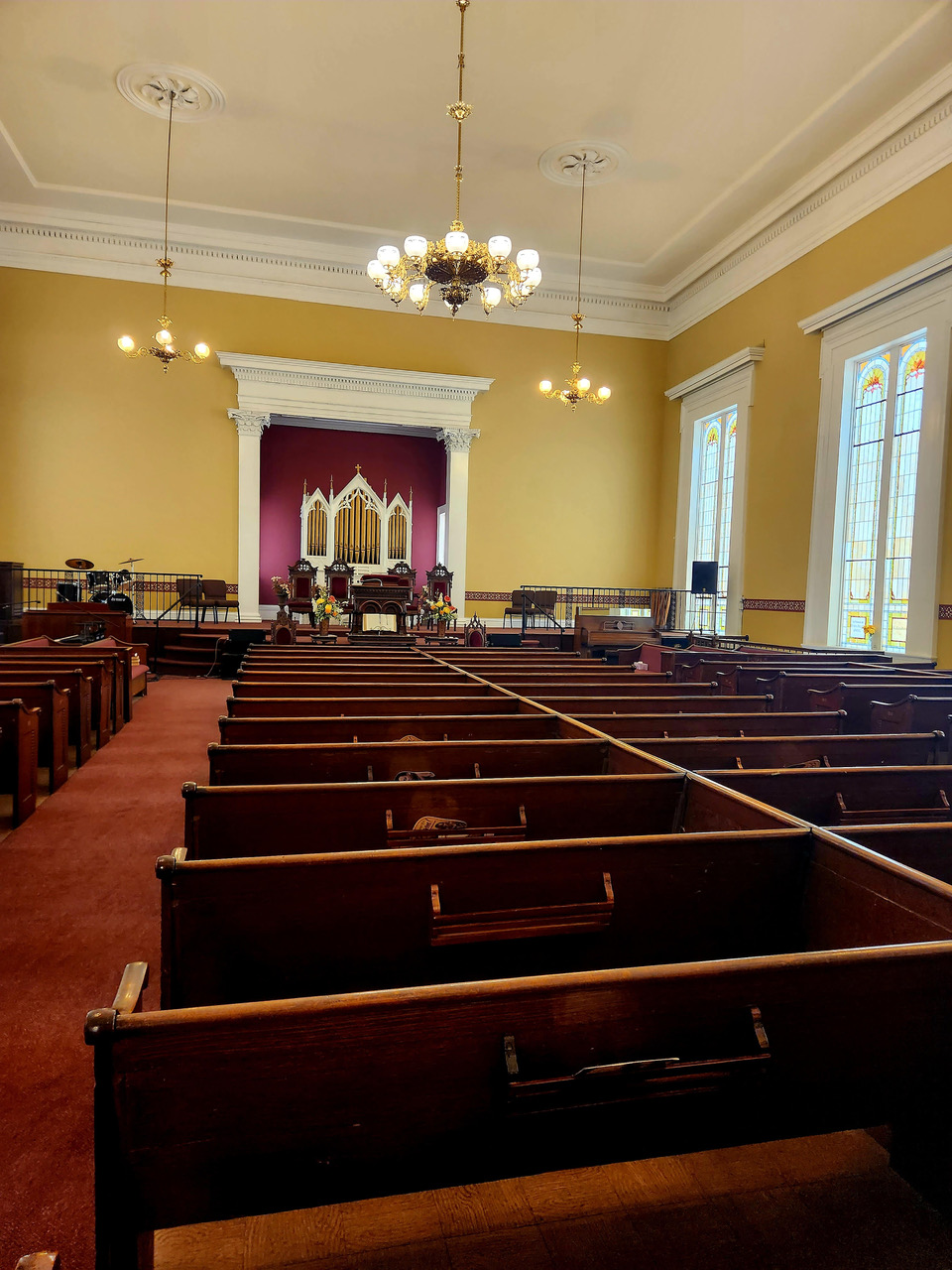#NNPA BlackPress
Tale of Two Underground Railroad Communities
ARIZONA INFORMANT — Prior to the Civil War, many communities in the Ohio River Valley were a part of an elaborate system that provided resources and protection for enslaved persons from Southern states on their journey to freedom. Once someone crossed the Ohio River, they traveled along unknown terrain of trails to safe houses and hiding places that would become known as the Underground Railroad.
The post Tale of Two Underground Railroad Communities first appeared on BlackPressUSA.

By Christopher J. Miller, Sr. Director of Education & Community Engagement, National Underground Railroad Freedom Center

Christopher J. Miller
September is International Underground Railroad Month.
This proclamation began in the State of Maryland in 2019, and now more than 11 States officially celebrate one of the most significant eras in U.S. history. With the signing of Ohio HB 340 in June 2022, Ohio became the 12th state to designate September International Underground Railroad Month.
Many history enthusiasts and scholars hope the momentum of the proclamation spreads to other states so that all our forebears of freedom are remembered.
Examining this era, you find that the Ohio River Valley is instrumental in the many narratives of freedom seekers. These stories are critical to our understanding of race relations and civic responsibilities.
Before the Civil War, many communities in the Ohio River Valley were part of an elaborate system that provided resources and protection for enslaved persons from Southern states on their journey to freedom. Once someone crossed the Ohio River, they traveled along unknown terrain of trails to safe houses and hiding places that would become known as the Underground Railroad.

Gateway to Freedom sign
The Underground Railroad was comprised of courageous people who were held to a higher law that confronted the institution of slavery with acts of civil disobedience by helping freedom seekers elude enslavers and slave hunters and help them get to Canada.
Many communities were a force for freedom along the more than 900-mile stretch of the Ohio River Valley, but I would like to focus on two significant communities.
Southern Indiana was a major part of this history. It was originally believed that there were from Posey to South Bend, Corydon to Porter, and Madison to DeKalb County, with many stops in between.
In further examination, the Underground Railroad in Indiana was a web of trails through the forests, swamps, briars, and dirt roads. The city that is often overlooked in reflecting on the history of the Underground Railroad is New Albany, Indiana.
By 1850, New Albany was the largest city in Indiana, with a population of 8,632. Free Blacks accounted for 502 of that population. Across the river, Louisville was Kentucky’s largest city, with a population of 42,829. A quarter of the 6,687 Black population were free in Louisville.

Town Clock Church (aerial view)
Louisville and New Albany would grow to become a significant region for Underground Railroad activity. People like Henson McIntosh became a prominent community member and major Underground Railroad conductor. McIntosh was one of approximately ten Underground Railroad agents in New Albany who used their wealth and influence to impact the lives of freedom seekers crossing the Ohio River.
The Carnegie Center for Art & History is an outstanding resource that continues to preserve New Albany’s role during the Underground Railroad era. Approximately 104 miles east along the Ohio River is another institution that plays a critical role in elevating the profile of the Underground Railroad on a national scope.

Inside Town Clock Church New Albany Indiana safe house
The National Underground Railroad Freedom Center is located on the banks of the Ohio River in Cincinnati, Ohio.
By 1850, Cincinnati would grow to be the 6th largest city in the Union, with a sizable Black population.
The Freedom Center is prominently located in the heart of a historic Black community called Little Africa. Although the community no longer exists, its legacy lives on through the Freedom Center.
As with New Albany, the community that resided along the banks of the river served an important role in the story of the Underground Railroad. Little Africa was the gateway to freedom for thousands of freedom seekers escaping slavery.
Although there were Underground Railroad networks throughout the country, Ohio had the most active network of any other state, with approximately 3,000 miles of routes used by an estimated 40,000 freedom seekers that crossed through Little Africa.
Despite the growth of enslavement leading up to the Civil War, communities such as Little Africa and New Albany reveal the realities regarding race relations and a model for the dignity of human life through their respective efforts to be kind and resilient friends for the freedom seekers.
For More Information:
National Underground Railroad Freedom Center – https://freedomcenter.org/
Cincinnati Tourism – https://www.visitcincy.com/
Carnegie Center for Art & History – https://carnegiecenter.org/
Southern Indiana Tourism – https://www.gosoin.com/
The post Tale of Two Underground Railroad Communities first appeared on BlackPressUSA.
#NNPA BlackPress
IN MEMORIAM: Ramona Edelin, Influential Activist and Education Advocate, Dies at 78
NNPA NEWSWIRE — Born on September 4, 1945, in Los Angeles, California, activist Ramona Edelin’s early years were marked by a commitment to education and social justice. According to her HistoryMakers biography, after graduating from Fisk University with a Bachelor’s degree in 1967, she pursued further studies at the University of East Anglia in England. She earned her master’s degree before completing her Ph.D. at Boston University in 1981.
The post IN MEMORIAM: Ramona Edelin, Influential Activist and Education Advocate, Dies at 78 first appeared on BlackPressUSA.

By Stacy M. Brown, NNPA Newswire Senior National Correspondent
@StacyBrownMedia
Once upon a time, Black Americans were simply known as colored people, or Negroes. That is until Ramona Edelin came along. The activist, renowned for her pivotal roles in advancing civil rights, education reform, and community empowerment, died at her D.C. residence last month at the age of 78. Her death, finally confirmed this week by Barnaby Towns, a communications strategist who collaborated with Dr. Edelin, was attributed to cancer.
Born on September 4, 1945, in Los Angeles, California, Edelin’s early years were marked by a commitment to education and social justice. According to her HistoryMakers biography, after graduating from Fisk University with a Bachelor’s degree in 1967, she pursued further studies at the University of East Anglia in England. She earned her master’s degree before completing her Ph.D. at Boston University in 1981.
Edelin’s contributions to academia and activism were manifold. She was pivotal in popularizing the term “African American” alongside Rev. Jesse L. Jackson in the late 1980s.
Jackson had announced the preference for “African American,” speaking for summit organizers that included Dr. Edelin. “Just as we were called Colored, but were not that, and then Negro, but not that, to be called Black is just as baseless,” he said, adding that “African American” “has cultural integrity” and “puts us in our proper historical context.”
Later, Edelin told Ebony magazine, “Calling ourselves African Americans is the first step in the cultural offensive,” while linking the name change to a “cultural renaissance” in which Black Americans reconnected with their history and heritage.
“Who are we if we don’t acknowledge our motherland?” she asked later. “When a child in a ghetto calls himself African American, immediately he’s international. You’ve taken him from the ghetto and put him on the globe.”
The HistoryMakers bio noted that Edelin’s academic pursuits led her to found and chair the Department of African American Studies at Northeastern University, where she established herself as a leading voice.
Transitioning from academia to advocacy, Edelin joined the National Urban Coalition in 1977, eventually ascending to president and CEO. During her tenure, she spearheaded initiatives such as the “Say Yes to a Youngster’s Future” program, which provided crucial support in math, science, and technology to youth and teachers of color in urban areas. Her biography noted that Edelin’s efforts extended nationwide through partnerships with organizations like the National Science Foundation and the United States Department of Education.
President Bill Clinton recognized Edelin’s expertise by appointing her to the Presidential Board on Historically Black Colleges and Universities in 1998. She also co-founded and served as treasurer of the Black Leadership Forum, solidifying her standing as a respected leader in African American communities.
Beyond her professional achievements, Edelin dedicated herself to numerous boards and committees, including chairing the District of Columbia Educational Goals 2000 Panel and contributing to the Federal Advisory Committee for the Black Community Crusade for Children.
Throughout her life, Edelin received widespread recognition for her contributions. Ebony magazine honored her as one of the 100 Most Influential Black Americans, and she received prestigious awards such as the Southern Christian Leadership Award for Progressive Leadership and the IBM Community Executive Program Award.
The post IN MEMORIAM: Ramona Edelin, Influential Activist and Education Advocate, Dies at 78 first appeared on BlackPressUSA.
#NNPA BlackPress
Tennessee State University Board Disbanded by MAGA Loyalists as Assault on DE&I Continues
NNPA NEWSWIRE — Recent legislative actions in Tennessee, such as repealing police reform measures enacted after the killing of Tyre Nichols, underscore a troubling trend of undermining local control and perpetuating racist agendas. The new law preventing local governments from restricting police officers’ authority disregards community efforts to address systemic issues of police violence and racial profiling.
The post Tennessee State University Board Disbanded by MAGA Loyalists as Assault on DE&I Continues first appeared on BlackPressUSA.

By Stacy M. Brown, NNPA Newswire Senior National Correspondent
@StacyBrownMedia
Tennessee State University (TSU), the state’s only public historically Black college and university (HBCU), faces a tumultuous future as Gov. Bill Lee dissolved its board, a move supported by racist conservatives and MAGA Republicans in the Tennessee General Assembly, who follow the lead of the twice-impeached, four-times indicted, alleged sexual predator former President Donald Trump. Educators and others have denounced the move as an attack on diversity, equity, and inclusion (DE&I) and a grave setback for higher education.
Critics argue that TSU’s purported financial mismanagement is a manufactured crisis rooted in decades of underinvestment by the state government. They’ve noted that it continues a trend by conservatives and the racist MAGA movement to eliminate opportunities for Blacks in education, corporate America, and the public sector.
Gevin Reynolds, a former speechwriter for Vice President Kamala Harris, emphasizes in an op-ed that TSU’s financial difficulties are not the result of university leadership because a recent audit found no evidence of fraud or malfeasance.
Reynolds noted that the disbanding of TSU’s board is not an isolated incident but part of a broader assault on DE&I initiatives nationwide. Ten states, including Tennessee, have enacted laws banning DE&I policies on college campuses, while governors appointing MAGA loyalists to university trustee positions further undermine efforts to promote inclusivity and equality.
Moreover, recent legislative actions in Tennessee, such as repealing police reform measures enacted after the killing of Tyre Nichols, underscore a troubling trend of undermining local control and perpetuating racist agendas. The new law preventing local governments from restricting police officers’ authority disregards community efforts to address systemic issues of police violence and racial profiling.
The actions echo historical efforts to suppress Black progress, reminiscent of the violent backlash against gains made during the Reconstruction era. President Joe Biden warned during an appearance in New York last month that Trump desires to bring the nation back to the 18th and 19th centuries – in other words, to see, among other things, African Americans back in the chains of slavery, women subservient to men without any say over their bodies, and all voting rights restricted to white men.
The parallels are stark, with white supremacist ideologies used to justify attacks on Black institutions and disenfranchise marginalized communities, Reynolds argued.
In response to these challenges, advocates stress the urgency of collective action to defend democracy and combat systemic racism. Understanding that attacks on institutions like TSU are symptomatic of broader threats to democratic norms, they call for increased civic engagement and voting at all levels of government.
The actions of people dedicated to upholding the principles of inclusivity, equity, and justice for all will determine the outcome of the ongoing fight for democracy, Reynolds noted. “We are in a war for our democracy, one whose outcome will be determined by every line on every ballot at every precinct,” he stated.
The post Tennessee State University Board Disbanded by MAGA Loyalists as Assault on DE&I Continues first appeared on BlackPressUSA.
#NNPA BlackPress
Braxton Haulcy and the Expansion of Walker|West Music Academy
May 24, 2023 – Walker West Music Academy gets an early start on expansion. Join us for a Wednesday episode of The …
The post Braxton Haulcy and the Expansion of Walker|West Music Academy first appeared on BlackPressUSA.

May 24, 2023 – Walker West Music Academy gets an early start on expansion. Join us for a Wednesday episode of The …
The post Braxton Haulcy and the Expansion of Walker|West Music Academy first appeared on BlackPressUSA.
-

 Activism4 weeks ago
Activism4 weeks agoOakland Post: Week of March 27 – April 2, 2024
-

 #NNPA BlackPress4 weeks ago
#NNPA BlackPress4 weeks agoBeloved Actor and Activist Louis Cameron Gossett Jr. Dies at 87
-

 Community1 week ago
Community1 week agoFinancial Assistance Bill for Descendants of Enslaved Persons to Help Them Purchase, Own, or Maintain a Home
-

 Activism3 weeks ago
Activism3 weeks agoOakland Post: Week of April 3 – 6, 2024
-

 Business1 week ago
Business1 week agoV.P. Kamala Harris: Americans With Criminal Records Will Soon Be Eligible for SBA Loans
-

 Activism2 weeks ago
Activism2 weeks agoOakland Post: Week of April 10 – 16, 2024
-

 Community1 week ago
Community1 week agoAG Bonta Says Oakland School Leaders Should Comply with State Laws to Avoid ‘Disparate Harm’ When Closing or Merging Schools
-

 Community6 days ago
Community6 days agoOakland WNBA Player to be Inducted Into Hall of Fame





















































